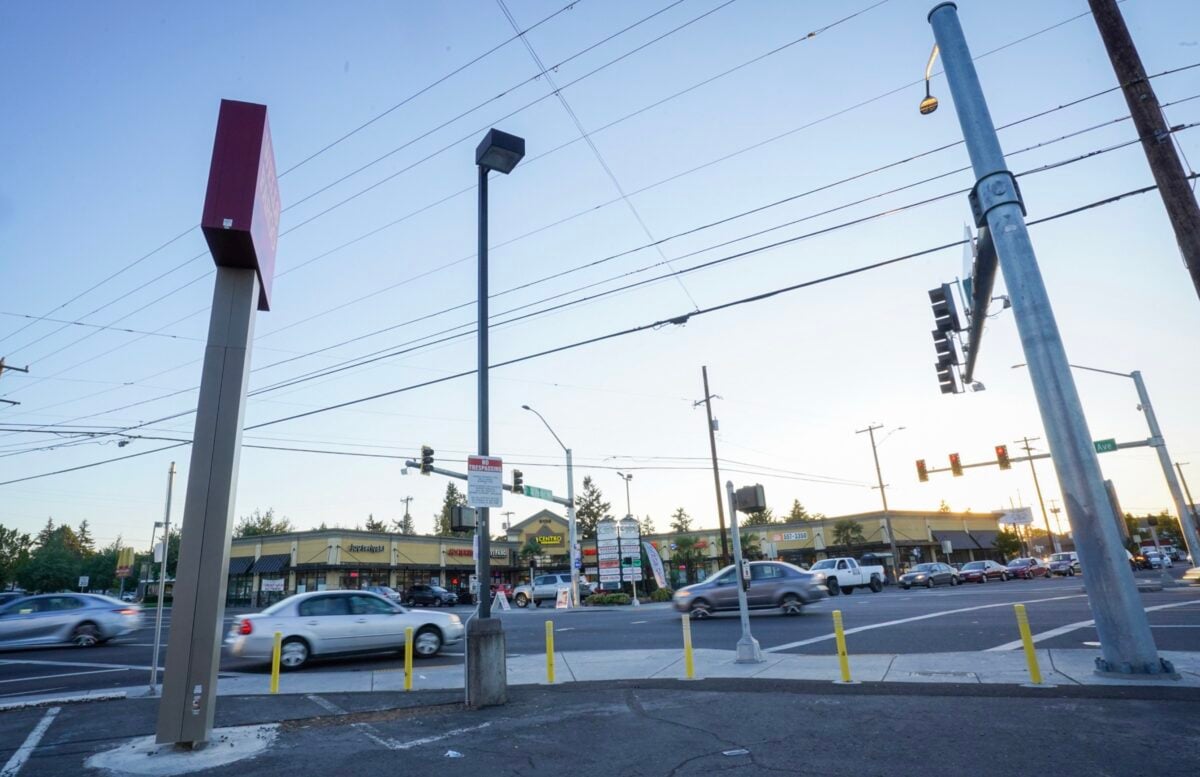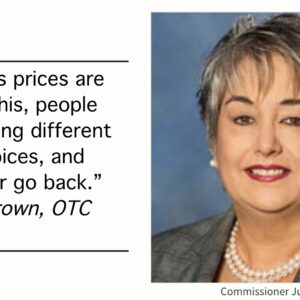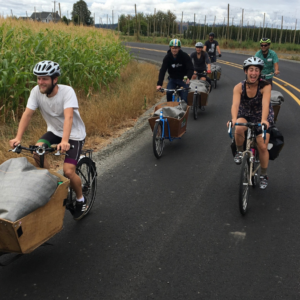| HB 3113 “Great Streets Bill” Hearing |
|---|
| — Thursday, 5:00 pm Joint Committee on Transportation — Bill overview — Hearing information |
It’s finally time for Oregon lawmakers to consider a new pot of funding that would improve safety on main streets and orphan highways across the state.
In January 2022, the Oregon Department of Transportation (ODOT) launched a new program called “Great Streets.” It came as the agency faced growing pressure to speed up safety projects on urban arterial streets after two people were killed while walking across Northeast 82nd Avenue (an ODOT-owned highway) in separate collisions within two weeks of each other.
Those tragic deaths forced ODOT and their bosses on the Oregon Transportation Commission (OTC) to finally reckon with the boiling pot of outcry from local leaders who’ve warned of safety risks on these dangerous and notoriously deadly arterials for decades — and who feel Oregon’s vast spending on freeway megaprojects doesn’t reflect urgent community needs. As ODOT took steps to transfer ownership of 82nd to the City of Portland, they also realized they had to put more non-freeway money on the table in a show of good faith.
In March of last year, the OTC allocated $50 million from President Joe Biden’s infrastructure bill to kickstart the Great Streets program. There is so much demand for non-freeway projects across the state that they received grant applications totaling $140,726,840 — over 400% of that $50 million. Those grants will be awarded later this fall and ODOT has said they will use the first tranche of funded as a “proof of concept” so they can refine the program for future disbursements.
The program is specifically meant to fund projects that, “improve safety and multimodal access on state highway corridors that also act as community main streets.” ODOT lists things like sidewalks, bicycle facilities, bus shelters, traffic calming devices, street trees, road diets, and crosswalks as eligible investments.
Now it’s the Oregon Legislature’s turn to step up and put more money into this pot. The question is: How much are they willing to spend?
There are two bills in the legislature that would seek to fill up the Great Streets coffers, and one of them will get its first public hearing tonight (4/6 at 5:00 pm) at the Joint Committee on Transportation.
House Representative Khanh Pham (D-SE Portland), a former community organizer who lives just off 82nd Avenue, is chief sponsor on House Bill 3516, which seeks $200 million out of the state’s General Fund (a $25 billion pot of personal and corporate income taxes) over a two-year period. There’s an nearly identical bill, HB 3113, sponsored by House Rep. and Joint Transportation Committee Co-Chair Susan McClain (D-Hillsboro) that leaves the funding amount blank.
HB 3113 is the one that will get a public hearing tonight, and the lobbying effort to make sure the amount is as high as possible has already begun.
“With an additional $100 funding in funding made possible via HB 3113, we can reduce the number of serious injuries and deaths on our most dangerous Orphan Highways while strategically investing in vibrant, safe, and sustainable main streets across Oregon.” reads a statement on a petition from The Street Trust. The nonprofit is working hard to turn out supporters of the bill. As of this morning over 300 Oregonians from 72 different zip codes have signed the petition.
There’s major support for this program in large part because Oregon’s State Highway Fund has constitutional restrictions about what it can be spent on (“exclusively for the construction, reconstruction, improvement, repair, maintenance, operation and use of public highways, roads, streets and roadside rest areas”). Money from the General Fund would give cities and counties much more flexibility to fund a wider array of projects.
Dan Huff, the city manager for the City of Mollala, a small town in Clackamas County about 30 miles south of Portland, wrote in his testimony for the bill that, “funding constraints limit our ability to focus on on… the safety, multimodal accessibility, equity, and climate mitigation enhancements that align with mutual state and city goals. HB 3113 would allow us to prioritize larger projects such as widening and access improvements for bikes/pedestrians on Highway 213.”
Michael Andersen, a senior housing and transportation researcher with the Sightline Institute, a nonprofit think tank, supports the bill because anything that reduces the need for car ownership, is an economic boon for the State of Oregon. “One of the biggest ways to reduce the cost of new buildings, with the fewest negative tradeoffs, is simply for their users to need fewer parking spaces,” he wrote in testimony submitted to the committee. “When the residents of a building or the customers of a store don’t need as many parking spaces, then all economic activity becomes cheaper and the associated space and money can be put to other, more profitable use.”








Thanks for reading.
BikePortland has served this community with independent community journalism since 2005. We rely on subscriptions from readers like you to survive. Your financial support is vital in keeping this valuable resource alive and well.
Please subscribe today to strengthen and expand our work.
Excuse my ignorance and lack of background on this, but why isn’t there more focus on changing this? Or has there been failed attempts in the past?
Probably what, 90%+ of the voters in the state drive, so it would likely be political suicide for any politician to try to change this in any drastic fashion. Look at the screaming when someone dares to spend money on bike lanes or pedestrian crosswalks.
Which is why it’s important to message to the public that getting people off the road, e.g. by making active transportation safer, it makes driving a more pleasant experience by decreasing traffic and congestion. If you frame it as, “we’re taking away a car lane for a bike lane [that nobody uses],” of course you’ll get pushback from the people who are tired of stop and go traffic. But if you frame it as, “we’re taking 10% of cars off the road so there are less cars in your way and fewer potholes to drive over,” you’ll find a much more receptive audience. The only way to fix traffic is to provide reasonable alternatives to driving, so that’s the way we need to frame any discussion around relieving traffic.
Sure, but there seems to be a lot of support on the local levels to have more people oriented street design. Beaverton just passed a complete streets policy, Tigard has been making progress towards safer streets, even Mollala to my surprise wants to make transportation improvements as mentioned in this article but are unable to due to what the highway fund will allow. Municipalities all over Oregon want safer streets that don’t always prioritize cars even if the mode share is mostly cars.
I don’t think it would be as big of a political lift to transform the Oregon State Highway Fund into a more general Oregon State Transportation Fund.
It would require an amendment to the Oregon Constitution. There was a push to do this in 2015 but the bill, SJR 16, never made it out of committee.
A ballot initiative would require signatures equivalent to 8% of the voters from the last governor’s election.
I liked AORTA’s (Association of Oregon Rail and Transit Advocates) write-up from 2015. It gives some background as to the attempt at that time.
https://www.aortarail.org/news/amend-state-constitution-to-allow-more-transportation-choice/
For sure, reform of Oregon gas tax rules would be a great thing. But, like 99% of the work needed on regional urban arterials would occur in road right of way and not be subject to this restriction.
I believe there is a bill this session that would refer a constitutional change to the ballot.
Sad to see SJ2 get short shrift this legislative session. Opening up the gas tax and DMV taxes and fees to these kinds of projects would go a long way to getting these funded!
More funding for this program would be excellent but needed with that is a more transparent process for how ODOT is identifying these projects and working with local jurisdictions to make sure their priorities are being addressed. It’s not clear how region staff are developing their projects submitted for evaluation.
Sightline Institute? LOL, they were a shill organization supporting the terrible city charter proposal with untruths. Be careful what they say…they are a hired gun and will support whoever pays them for their “analysis”.
Got a kick out of yesterday’s report about car parks nationwide could collapse under the weight of heavier electric cars because of aging infrastructure. Okay, but at some future time will be be asked to pony up to replace aging car parks?
Speaking of orphan highways, let’s talk about 99E. The highway as a whole may be beyond saving, but there needs to be a safer bicycle crossing at McLoughlin and 17th Ave. This is the main crossing from Sellwood-Moreland to points North (other than the Springwater). At minimum, there should be green zebra stripes to alert drivers to expect people riding bicycles across the 6-lane intersection.
There is some chatter about fixing all this, but it is still in the development phase.
https://bikeportland.org/2023/03/24/odot-wants-to-make-se-mcloughlin-safer-for-bikes-371839
The governor and legislature could start by repealing the ban on pulling over cars with non-existent license plates and non-functional headlights and brake lights. The dangerous behavior of unaccountable drivers will otherwise continue to spiral.
I’m one of the citizens on the committee scoring and ranking projects for Great Streets. The projects aren’t perfect and I mention as such in my comments, but there’s definitely some good bits in there. They are also projects that the local communities and/or cities and that’s a great step IMO